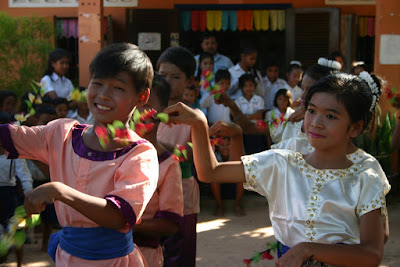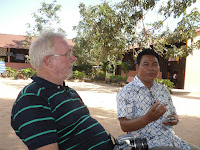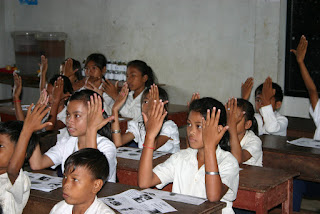Our final afternoon of our 'tour' this time was spent in the delightful company of the SSF Apsara dancers - those children that Nick watched rehearsing with Lyda, their teacher, a few Sundays ago. Sarin had arranged for a full public performance, in costume, especially for us - and we felt very privileged to be sitting in the shade of the large tree in the compound - one which Sarin had planted there some eight years previously - to see the fruits of all that practice. It seemed fitting to watch this dancing taking place outside in the sunshine, dancing enacting practical movements of planting and harvest and the usual village activities.As we sat there watching the children perform with such enjoyment, naturalness and easy manner, with many of the pupils from other classes joining in the fun, we were reminded just why we had been drawn to the Spitler School Foundation years ago.
Sitting talking to Sarin, reflecting on Khmer society and matters of life and death, we were aware of the "family" that we have joined. Like all families we sometimes disagree, strongly, get disheartened, tired and fed up, but always there is someone else in the family feeling optimistic, energetic and full of ideas to get us back on track.
 |
| Sophea and Choeumroeun shake clean hands. |
That morning we had again welcomed our friends from Pannasastra University into Spitler School to help with the hygiene training. They were enthusiastic about using the finger puppets (germs that come off one at a time as we use water, soap, brush etc) and the hand puppets enacting scenes about the village. They remarked about how "different" the school felt to their own experiences of primary school and we hope to have extended their teaching repetoire beyond the chanting and usual stuff they have known. We look forward to continuing to work with them as they make excellent role models to our village children of what can be achieved through education.
They are happy to volunteer their time, when they are not working for exams at University, and it is good for us to realise that we do not need to turn exclusively to Western volunteers for expert help. We hope too that the new "nurse" in place there will continue to work with the children to raise standards of cleanliness beyond their experience to date.
 |
| A dramatic moment for Socheat and Chomroeun |
 |
| Kangna, our new 'nurse', is introduced to the children. |
The day before we left we were saddened to hear of the deaths of nine people who lived and worked in the Night Market. Fire had spread rapidly and many people living above the market stalls had been trapped. Siem Reap mourned their loss with funerals at the wats around town and processions of people carrying their lotus flowers. Although Siem Reap is very busy at the moment with high season, anyone who lives here for any time is touched by the kindness of local people who are experiencing severe poverty with such pride.
We have left Siem Reap now, faced the joys of a border crossing in Poipet, been madly driven by taxi to Bangkok and now settled for a few days in Hua Hin. Already we are reflecting on our friends back there and wondering what they are doing.
We hope to meet up with our "other half" Jim, in a few days time to talk, plan and have a few jars. The Foundation is at an interesting crossroads now, needing to look ahead to the challenges of the future and build on the strong foundations that have been laid over the past eight years. We wish our supporters well and will continue to update this blog with news when we can.
And don't forget - the foundation relies totally on donations to support these two schools. Without these funds some seven hundred children would lack a primary school education. We personally regularly hold "Curry for Cambodia" evenings at home where we invite friends to share a meal cooked by us and auction off various scarves and trinkets found in local markets. All the money raised goes directly to the school and on one occasion we raised $407 which we sent off. Coincidentally Jim had asked for $400 in order to buy some books for the library on the same day. No matter how much or little we send we know that good use will always be made of the money donated. We think the curry evening idea could go global!
And finally . . . the boys join with the girls for the coconut dance! They're certainly getting there, and the girls show, we think, a remarkable tolerance and good humour. A real reflection of the Cambodian temperament.















































